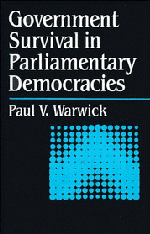Book contents
- Frontmatter
- Contents
- List of tables and figures
- Preface
- GOVERNMENT SURVIVAL IN PARLIAMENTARY DEMOCRACIES
- 1 Introduction: the government survival debates
- 2 The quantitative study of government survival
- 3 Basic attributes and government survival
- 4 The role of ideology
- 5 Economic conditions and government survival
- 6 The underlying trend in government survival
- 7 Model adequacy
- 8 Conclusion: an alternative perspective on government survival
- Appendix: a codebook of variables used in this study
- Notes
- References
- Index
1 - Introduction: the government survival debates
Published online by Cambridge University Press: 19 September 2009
- Frontmatter
- Contents
- List of tables and figures
- Preface
- GOVERNMENT SURVIVAL IN PARLIAMENTARY DEMOCRACIES
- 1 Introduction: the government survival debates
- 2 The quantitative study of government survival
- 3 Basic attributes and government survival
- 4 The role of ideology
- 5 Economic conditions and government survival
- 6 The underlying trend in government survival
- 7 Model adequacy
- 8 Conclusion: an alternative perspective on government survival
- Appendix: a codebook of variables used in this study
- Notes
- References
- Index
Summary
The liberal democratic world is composed for the most part of two very different regime types: the presidential and the parliamentary. Needless to say, comparisons between the two have long been a stock-in-trade of political analysts and propagandists. Typically, the presidential system – I take the United States as the prototype – is praised for its elaborate separation and balancing of powers, its constitutionally enshrined protection of individual rights and freedoms, and its governmental stability. There is a price to be paid for these advantages, however, and it is usually seen in the multifarious possibilities for stalemate or deadlock between formally separate institutions of government (Congress vs. president, Senate vs. House of Representatives, etc.). When these stalemates become serious, U.S. observers occasionally turn an admiring eye toward the parliamentary regime of Britain, where the fusion of executive and legislative powers under a disciplined, majoritarian party appears to open the door to rapid and coherent government action – even if the lack of checks on executive power is regretted.
While the “Westminster model” of parliamentary government is highly respected, a similar regard is seldom extended to the parliamentary system of government as a whole; the functioning of what is essentially the same regime type in Italy, for instance, more often elicits criticism or ridicule than praise. This bifurcation in perceptions of parliamentary government stems from the fact that its fundamental principles do not in themselves guarantee that decisive government action will be possible.
- Type
- Chapter
- Information
- Government Survival in Parliamentary Democracies , pp. 1 - 16Publisher: Cambridge University PressPrint publication year: 1995



